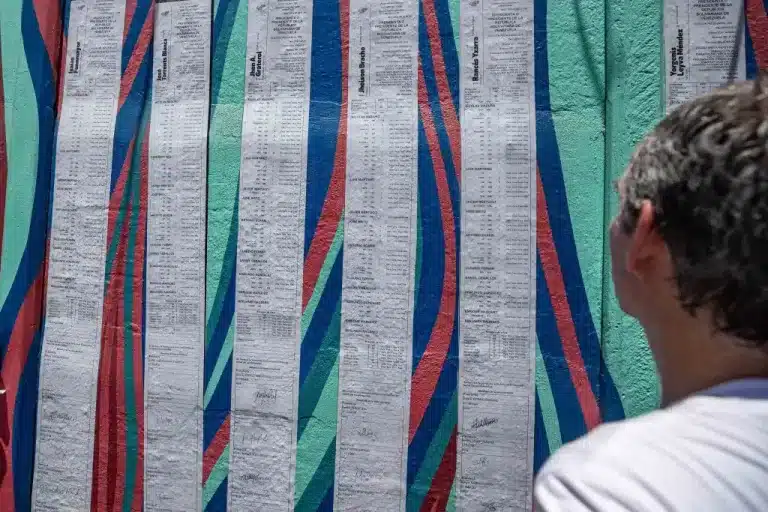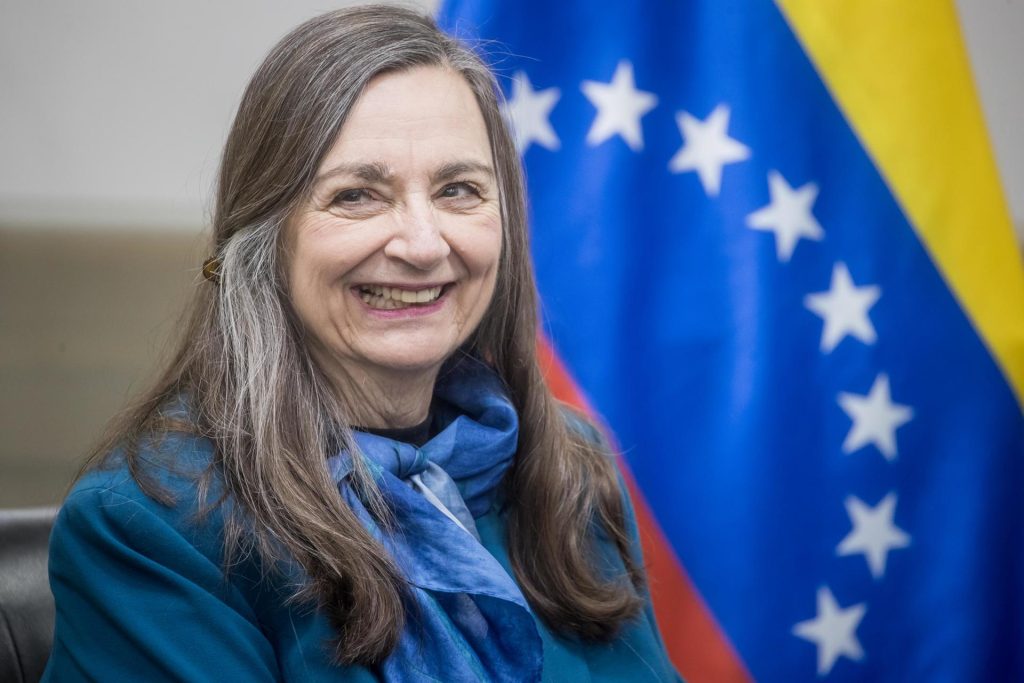11 de agosto 2024

Children of Exile: The Births “Sowing Hope” in the Camp of Nicaraguan Farmers

PUBLICIDAD 1M
PUBLICIDAD 4D
PUBLICIDAD 5D
Jennie Lincoln: there is no evidence of an alleged hack; Maduro should be proud of the Venezuelan electronic voting system

A person looks at a collage with minutes from the National Electoral Council during a rally called by opposition leader Maria Corina Machado, in Caracas. EFE | Confidencial
Jennie Lincoln, the senior advisor for the Carter Center for Latin America and head of the only independent election observation mission at Venezuela’s July 28th elections, has no doubts about the results. “We reviewed 24,533 tally sheets (collected by opposition witnesses) with 81.7% (of the total voting records), and we agree with the analysis of these records that show that Edmundo González won with nearly 70%, by a 2 to 1 margin,” Lincoln said in an interview on the program Esta Semana, to be broadcast on CONFIDENCIAL’s YouTube channel this Sunday, August 11 at 8:00 PM.
The political scientist and expert in election observation dismisses any claims of a hack of the National Electoral Council’s Internet system on July 28 (as claimed by President Maduro) or any external interference in the electronic voting system. “There is no proof, no evidence whatsoever,” says Lincoln, recalling that in the early hours of July 29, the president of the National Electoral Council (CNE), Elvis Amoroso, said that they had received 80% of the vote, although the system actually totaled 92%, and he promised to “post on the CNE website all the results, precinct by precinct, and deliver a digital copy of those results to the participating political parties. However, so far, (two weeks later) none of these actions have been fulfilled.”
Lincoln believes that President Nicolas Maduro, who was running for re-election, should be proud of “having a good system (of voting), and their good system means they have the detailed results,” both the governing United Socialist Party of Venezuela (PSUV), and President Maduro.
Two weeks after the Venezuelan election, the National Electoral Council continues to award victory to Nicolas Maduro without showing the detailed voting results, while the opposition, with 82% of the records, claims that Edmundo González won decisively. Does the Carter Center’s observation mission have a conclusion on the outcome of this election?
We have loudly stated that this election does not meet international standards, it is not a democratic election. But I want to explain how we reached this conclusion.
We received an invitation from the National Electoral Council (CNE) based on the Barbados Agreement, signed in October last year between the opposition and the government, with some rules for this presidential election. We negotiated a memorandum of understanding with the CNE to secure some guarantees they gave us: 1. Access to the electoral process, 2. Freedom of movement throughout the country, without restriction, 3. Freedom of expression, to speak whenever we wanted, talking about our observations, without a filter, without restrictions. So, we arrived with this memorandum in hand, although the invitation to the European Union had been revoked, meaning we were the only group of independent observers.
We were not a large group, 17 experts from 11 countries. An international mission with experts who have been involved in elections worldwide. We focused on election administration, evaluating the electoral context with a huge imbalance against the opposition, which decided to participate in the election despite this. That’s the scenario leading up to the night of July 28. We spoke with nine of the ten presidential candidates and campaigns, except for Nicolas Maduro, who did not receive us. However, the participation on July 28 was considerable.
You mentioned the discrepancy between the results of the National Electoral Council and what the opposition claims based on the tally sheets. Have you conducted an independent verification of the records presented by the opposition?
Yes, it’s true. We reviewed 24,533 tally sheets, 81.7% of the total, and we agree with the analysis of these records showing that Edmundo Gonzalez won with nearly 70%, a 2 to 1 margin.
It’s extremely important for your audience to understand that Venezuela’s electoral process is good. Their system is impressive because it’s not just electronic voting; the electronic vote has two proofs: one of these are the vote tally sheets. That’s the printout of the summary of the votes that comes out of the machine at night after the polling station closes. The machine sends the results directly via landlines, cell phones, and satellites to the CNE. At the same time, the machine immediately prints a primary record to also send to the CNE.
Moreover, each witness at the precinct receives a copy of the tally sheet. This means that not only the opposition witnesses but also the PSUV witnesses from President Nicolas Maduro’s party, they themselves may have copies of all the 30,026 voting precincts, these records are public documents. This is the first proof. The second proof is the ticket the voter receives. When voting, the jperson receives a slip to confirm their vote and deposits this ticket in a cardboard box. So there is plenty of primary evidence to confirm this count made by the opposition members, stating that the votes favored Edmundo Gonzalez.

Maduro and his party argue that the National Electoral Council cannot release the results because the system was hacked. Is there any evidence that a hack or interruption occurred in the National Electoral Council’s computer system?
There is no proof, no evidence whatsoever. On the contrary, there are companies in the region that monitor denial of service within the Internet system in the region, and there was no report of a denial of service in Venezuela that night.
Secondly, among the people inside the transmission room, there were CNE people, there were also witnesses in the transmission room, monitoring the transmission rate that night, and they confirm that by midnight they had received 92% of the votes by transmission without any failure. There was a moment when the rate was slower, but it didn’t stop. This is proof that there was no hack.
The third proof comes from the words of CNE President (Elvis) Amoroso, when he reported at 12:10 AM on the 29th that he had in his hand a vote count. He said they had received 80%, which wasn’t true because he had more, but he said they had 80%, and announced 51% for Maduro and 44% for Edmundo Gonzalez. He himself said: “I have the records at this moment”, then changed his narrative, even worse, he announced at that moment: “we are going to put on our website all the precinct-by-precinct results, and we will also deliver a digital copy of the count to the political parties”. To date, neither of these actions has been fulfilled.
Maduro said that he has the tally sheets but that he would only deliver them to the Supreme Court, which, according to him, is now in charge of making that verification. But you say that the records do exist, meaning Maduro has the records and the National Electoral Council also has them.
Absolutely. And this should be part of his pride in having a good voting system, and his good system means they have the records. Delivering the tally sheets to the Supreme Court of Justice is a distraction. That’s unnecessary because the CNE itself has the records. Also, I repeat, the PSUV, President Maduro’s party, also has the records.
If the National Electoral Council finally publishes the precinct tally sheets, as Brazil, Colombia, Mexico, and many other countries are demanding, would the Carter Center accept participating in an independent verification of those records?
It’s unnecessary if they deliver the true tally sheets, just like those that were distributed at the 30,000+ voting precincts on election night; it’s unnecessary, the evidence exists. Verification would be contingent upon President Amoroso delivering the true records, and that will provide the proof. If he delivers that, he will have to acknowledge that the opposition candidate had more votes than Nicolas Maduro, contrary to what was announced on the night of July 28th.
You talk about “true tally sheets.” Can they be altered by those who have had them under their control for these two weeks, or would there be visible evidence for electoral experts?
Absolutely, because in terms of technology, almost anything is possible, but falsifying these tally sheets would be a time-consuming and labor-intensive task. We’re talking about 30,026 tally sheets. Changing data on a percentage of them would take time, and it would be a monumental exercise. And it will be noticeable because the first evidence came out of each machine on the night of the 28th, and not just one but several paper copies, 5, 6, 8, 12 copies on the night of the same transmission to the CNE. So all of this is theater because the CNE knows they have the key information, and the key information they have is not the same as what the CNE announced on the night of the 28th.
President Nicolas Maduro has accused the Carter Center of sponsoring and promoting a coup against the Venezuelan government. How do you respond to that accusation?
He knows who we are. We have been in Venezuela before. They invited us, explaining that we represent an entity capable of maintaining independence. He knows, it’s an attack against us. You all know that we have observed over 120 elections worldwide, and there is no doubt about the integrity of the Carter Center and its voice when it says that this election does not meet international standards, partly due to the failure of transparency, or lack of transparency on the part of the CNE.
This article was published in Spanish in Confidencial and translated by Havana Times. To get the most relevant news from our English coverage delivered straight to your inbox, subscribe to The Dispatch.
PUBLICIDAD 3M
Periodista nicaragüense, exiliado en Costa Rica. Fundador y director de Confidencial y Esta Semana. Miembro del Consejo Rector de la Fundación Gabo. Ha sido Knight Fellow en la Universidad de Stanford (1997-1998) y profesor visitante en la Maestría de Periodismo de la Universidad de Berkeley, California (1998-1999). En mayo 2009, obtuvo el Premio a la Libertad de Expresión en Iberoamérica, de Casa América Cataluña (España). En octubre de 2010 recibió el Premio Maria Moors Cabot de la Escuela de Periodismo de la Universidad de Columbia en Nueva York. En 2021 obtuvo el Premio Ortega y Gasset por su trayectoria periodística.
PUBLICIDAD 3D